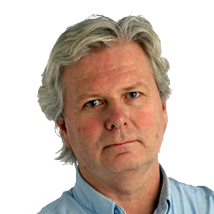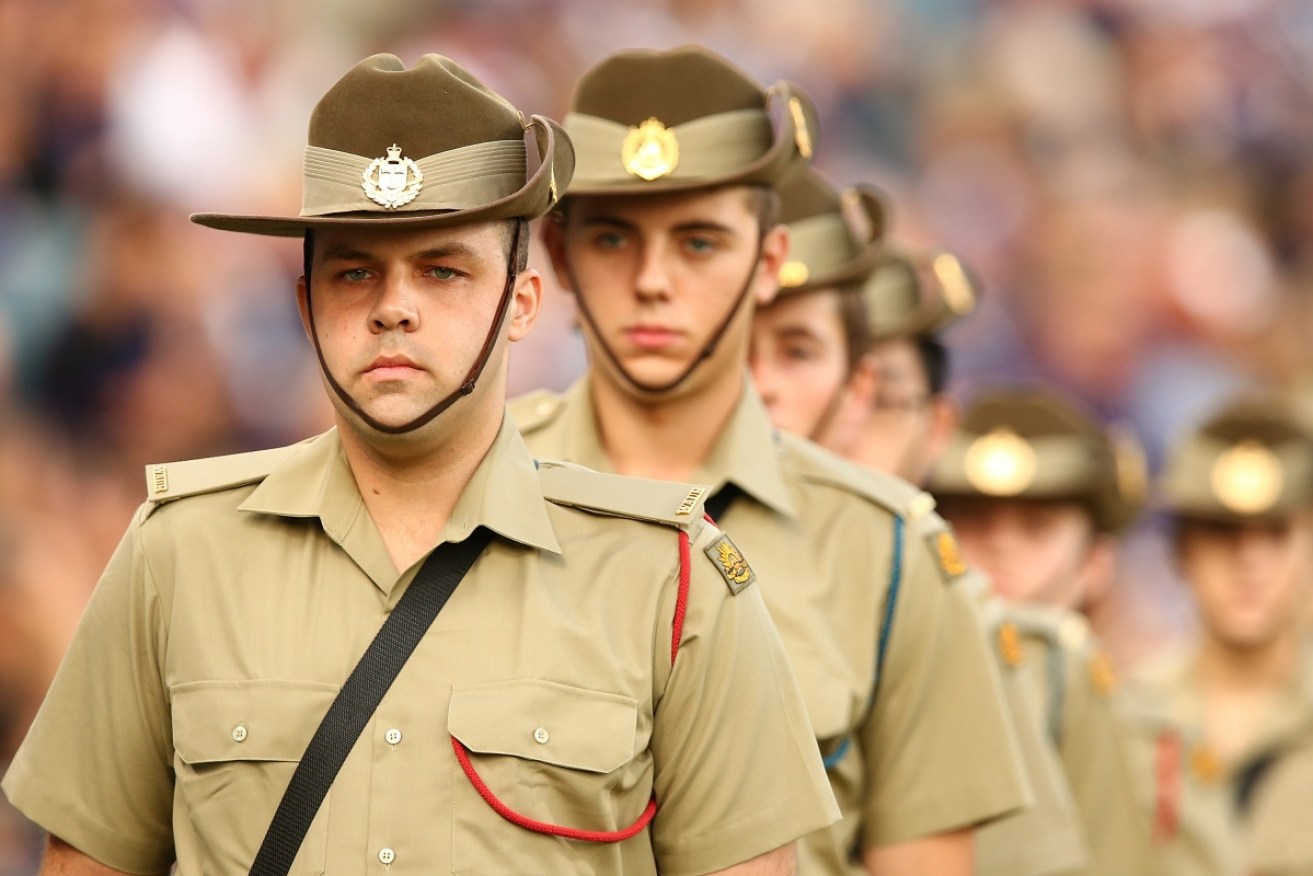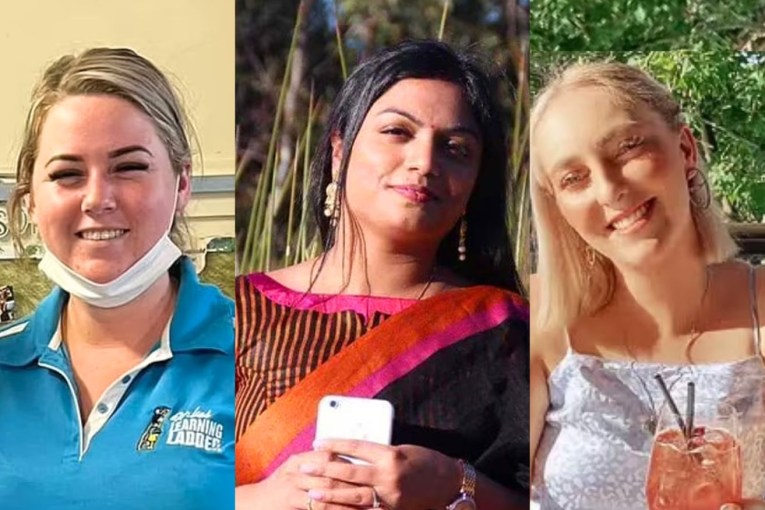The question we should consider on Anzac Day


There's more to April 25 than parades. It's time to consider something more poignant. Photo: Getty
A shaft of light born more than a century ago on the death-creased shores of Gallipoli washes over our culture and identity.
Anzac Day dawns on the nation.
It was a catastrophic failure that took 8000 Australian lives and, with the passing of time, has turned from an honouring of the sacrifices of those dead and injured to include all those who have served in the military for this country.
My father, who served in the Korean War, used to march with pride. He was president of the local RSL branch and spoke at the service on Anzac Day. Underlying his words was the belief that every death, injury and sacrifice would lead to a better world for the children, who hopefully, would never have to face war themselves.
It is the arc of the dreamer; that the present will heed the past, that we will learn from our mistakes.
And yet what drives this hope is that people, essentially, are good, despite everything – despite genocide, the Holocaust, the slaughter of innocents.
It is testing times to be a dreamer. But then, it always has been.
Syria 2017:
“Dozens of children suffocated to death while they slept. This should strike at the very core of our humanity. How much longer will the world fail to respond to these heinous crimes?”
– Ahmad Tarakji, Syrian American Medical Society
The Western Front 1917:
“Last night I had to go up with a party. We got lost in the snow. I went on ahead to scout – foolishly alone – and, when half a mile away from the party, got overtaken by GAS. It was only tear gas from a shell and I got safely back … They want to call No Man’s Land England because we keep supremacy there … It is pock-marked like a body of foulest disease, and its odour is the breath of cancer … I would as soon as call my house Krupp Villa, or my child Chlorina-Phosgena.”
– Wilfred Owen
Chlorine-Phosgena were references to two of several gases – others were sarin and mustard – used in WWI. They are still used today. The government forces of Bashar al-Assad and those of Islamic State have used the chemical weapons in Syria and Iraq. Last week’s headline: “Assad has 3000kg of chemical weapons.”

Victims of a recent toxic gas attack in the Syrian town of Idlib.
And yet such weapons seem benign against other armoury.
Eight countries have roughly 15,000 nuclear warheads between them: the United States, Russia, France, China, Britain, Israel, Pakistan and India. North Korea is trying.
Of those, says the Federation of American Scientists, the US and Russia each have roughly a couple of thousand deployed, and about 4000 each stockpiled.
If US President Donald Trump and Russian President Vladimir Putin fired off a nuclear warhead each day for more than five years they would still have change. Given global annihilation would come at a fraction of the number already in existence, a sane person might ask: ‘Why?’
And who would record the apocalypse? Who would take the carnage and shape it into both art and warning, as Owen and his fellow soldiers/poets did in WWI?
According to AC Grayling in his new book, War An Enquiry, the chief of the RAF, Sir Hugh Trenchard, in the aftermath of WWI said that war would end all the more quickly with fewer lives lost if gas were used: “‘Gas may well prove the salvation of civilisation from the otherwise inevitable collapse in the case of another great war’. His view implied that the threat of gas attacks from the air might prevent war altogether.”
Such stupidity. While there are weapons, there will be war. A nuclear warhead is but a spear built by a smarter human. And so the circle goes round without getting closer to wisdom.
One of Owen’s masterpieces Dulce et Decorum est was published just a few years earlier than the utterance of the benighted knight. The poet never saw it, nor most of his work, in print.
Among Owen’s notes was a preface to his poems. It reads in part:
“Above all I am not concerned with poetry. My subject is war; and the pity of war. The poetry is in the pity. Yet these elegies are to this generation in no sense consolatory. They may be to the next. All a poet can do today is warn. That is why the true poets must be truthful.’’
Truly, no one suffered more for their art than those who died in battle such as Owen, Edward Thomas, Joel McCrae, Charles Sorley and Isaac Rosenberg, but those who survived were deeply affected by it such as Robert Graves, Siegfried Sassoon and Ivor Gurney.
In mid-1917, Sassoon, a highly decorated officer, rebelled, declaring he would no longer serve, his scathing denunciation of Britain’s war aims was read out in Parliament and published in The Times.
His words, like those of his peers, bore witness to horror. Rosenberg, in 1917, wrote of the dead and living bumping against each other in “Dark earth, dark heavens swinging in chemic smoke’’. He died in April 1918 at the battle of Arras.
But words, no matter how strong, cannot be heard over the blast of bombs or be said when lungs are filled with poison.
A century later, tyrants, democracies and thugs still use gas, still engage in power displays of missiles and parades of humans in uniforms. We call it nations flexing their military muscle. We should call it the never-ending carnival of the walking dead. Has one single verdict regarding crimes against humanity stopped war in its tracks? Where one conflict ends, another rises.
Dreamers may think that war is the last resort, after words have failed. But what if this is not so? War is destruction. It is the death sentence, nonpareil. If, by the 21st century, we haven’t seen enough death from war, seen enough of the hell we can rain down on humans, seen enough mountains of skulls, lifeless bodies of children, then where sits the cries from the heart that pleads, ‘no more’.
The human species has survived through adaptation to its environment. But what if survival of the fittest relies on creating war and not art? Not all men are good, as history has shown, but surely the exception should not prove the rule. And some wars are “good”. No one, barring madmen or women, could defend the Third Reich, and censure the war to bring Hitler down.
The fallen of WWI, including Australia’s dead and wounded from that conflict, did not die in a “good” war. It was mass industrial slaughter born from a hideous alignment of obscene self-interest. Should we still honour their memory? Of course.
But after the waving of flags, the giving of salutes and the passing of parades, we should remember the words of this survivor from a gas attack in Syria in 2013: “It just took seconds before I lost my ability to breathe … I felt like my chest was set on fire. My eyes were burning like hell. I wasn’t able even to scream or to do anything. So I started to beat my chest really hard … to take a breath … It was so painful. It felt like somebody was tearing up my chest with a knife made of fire.”
And perhaps, silly as it might seem, dream on. That in the words of WB Yeats, not in his bee-loud glade, but in the echo chamber of conflicts worldwide, peace may come dropping slow. It is, in its way, an artform to believe. It lived in my father.
Warwick McFadyen is a freelance writer and editor.








